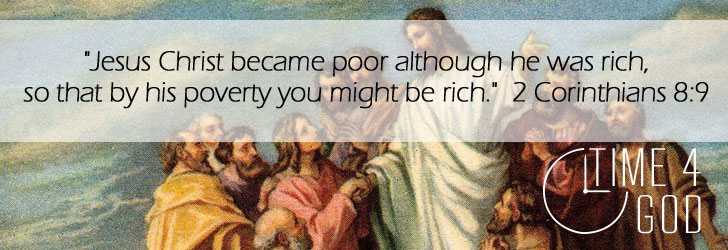Generosity in Giving
In this passage, Paul is inviting the believers of Corinth to be generous in their support of the mission, as well as for each other.

In this passage, Paul is inviting the believers of Corinth to be generous in their support of the mission, as well as for each other. He tells them of how the Church in Macedonia, though poor, in all eagerness, ʺbegged us insistently for the favor of taking part in the service to the holy ones, and this, not as we expected, but they gave themselves first to the Lord and to us through the will of God…ʺ
Jesus is our model here. Though he was rich, he chose to become poor, to let go of all that he possessed, even his life, in order that we who are poor might become rich in him. (See Philippians 2:6-8) Paul is introducing the idea of equality here. The challenge to those who are rich here is not to impoverish themselves, but to share their resources, ʺ…not that others should have relief while you are burdened, but that as a matter of equality your surplus at the present time should supply their needs, so that their surplus may also supply your needs, that there may be equality. As it is written, ‘Whoever had much did not have more, and whoever had little did not have less.’ʺ (2 Corinthians 8:13-15) In this way an equal balance is achieved, at least over the course of time.
[content-ad]
This is what the great early Church theologian Clement of Alexandria had to say about this passage:
ʺLet us teach the prosperous that they are not to neglect their own salvation, as if they had been already foredoomed, nor on the other hand, to cast wealth into the sea, or condemn it as a traitor and and enemy to life, but learn in what way and how to use wealth and obtain life.
The Savior by no means has excluded the rich on account of wealth itself, and the possession of property, nor fenced off salvation against them, if they are able and willing to submit their life to God’s commandments, and prefer them to transitory things…If one is able in the midst of wealth to turn from its mystique, to entertain moderate desires, to exercise self-control, to seek God alone, and to breathe God and walk with God, such a man submits to the commandments, being free, unsubdued, free of disease, unwounded by wealth. But if not, ‘sooner shall a camel get through a needle’s eye, than such a rich man reach the kingdom of God.’
Do not let this passage trouble you. Put is side by side with the still harder saying Jesus delivered in another place in the words, ‘Whoever hates not father, and mother, and children, and his own life besides, cannot be my disciple.’ Note that the God of peace, who exhorts us to love our enemies, does not arbitrarily require us literally to hate or abandon those dearest to us…But insofar as one’s father, or son, or brother, becomes for you a hindrance to faith or an impediment to Godly life, one should not collude with that temptation… Attend to the spiritual, rather than the fleshly, is the meaning of the command.ʺ
Attend to the spiritual first, rather than to the fleshly things of the world, in matters of wealth too. It is not an evil in itself, but if it becomes a stumbling block, a hindrance, or an impediment to living a Christ-like life, then one should not collude with it. On the other hand, if you use it to meet the needs of those who are poor, you are, indeed, submitting to the commandment of love that Jesus calls us to honor in this world. ʺGive to the poor and you will have treasure in heaven.ʺ (Matthew 19:21)
SKM: below-content placeholderWhizzco for FHB

